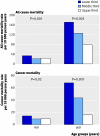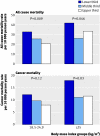Association between muscular strength and mortality in men: prospective cohort study
- PMID: 18595904
- PMCID: PMC2453303
- DOI: 10.1136/bmj.a439
Association between muscular strength and mortality in men: prospective cohort study
Abstract
Objective: To examine prospectively the association between muscular strength and mortality from all causes, cardiovascular disease, and cancer in men.
Design: Prospective cohort study.
Setting: Aerobics centre longitudinal study.
Participants: 8762 men aged 20-80.
Main outcome measures: All cause mortality up to 31 December 2003; muscular strength, quantified by combining one repetition maximal measures for leg and bench presses and further categorised as age specific thirds of the combined strength variable; and cardiorespiratory fitness assessed by a maximal exercise test on a treadmill.
Results: During an average follow-up of 18.9 years, 503 deaths occurred (145 cardiovascular disease, 199 cancer). Age adjusted death rates per 10,000 person years across incremental thirds of muscular strength were 38.9, 25.9, and 26.6 for all causes; 12.1, 7.6, and 6.6 for cardiovascular disease; and 6.1, 4.9, and 4.2 for cancer (all P<0.01 for linear trend). After adjusting for age, physical activity, smoking, alcohol intake, body mass index, baseline medical conditions, and family history of cardiovascular disease, hazard ratios across incremental thirds of muscular strength for all cause mortality were 1.0 (referent), 0.72 (95% confidence interval 0.58 to 0.90), and 0.77 (0.62 to 0.96); for death from cardiovascular disease were 1.0 (referent), 0.74 (0.50 to 1.10), and 0.71 (0.47 to 1.07); and for death from cancer were 1.0 (referent), 0.72 (0.51 to 1.00), and 0.68 (0.48 to 0.97). The pattern of the association between muscular strength and death from all causes and cancer persisted after further adjustment for cardiorespiratory fitness; however, the association between muscular strength and death from cardiovascular disease was attenuated after further adjustment for cardiorespiratory fitness.
Conclusion: Muscular strength is inversely and independently associated with death from all causes and cancer in men, even after adjusting for cardiorespiratory fitness and other potential confounders.
Conflict of interest statement
Competing interests: None declared.
Figures



Comment in
-
Muscular strength and mortality in men.Clin J Sport Med. 2009 Mar;19(2):150-1. doi: 10.1097/JSM.0b013e31819ca6c2. Clin J Sport Med. 2009. PMID: 19451772 No abstract available.
References
-
- Stump CS, Henriksen EJ, Wei Y, Sowers JR. The metabolic syndrome: role of skeletal muscle metabolism. Ann Med 2006;38:389-402. - PubMed
-
- Wolfe RR. The underappreciated role of muscle in health and disease. Am J Clin Nutr 2006;84:475-82. - PubMed
-
- Pollock ML, Franklin BA, Balady GJ, Chaitman BL, Fleg JL, Fletcher B, et al. AHA science advisory. Resistance exercise in individuals with and without cardiovascular disease: benefits, rationale, safety, and prescription: An advisory from the Committee on Exercise, Rehabilitation, and Prevention, Council on Clinical Cardiology, American Heart Association; position paper endorsed by the American College of Sports Medicine. Circulation 2000;101:828-33. - PubMed
-
- Kraemer WJ, Adams K, Cafarelli E, Dudley GA, Dooly C, Feigenbaum MS, et al. American College of Sports Medicine position stand. Progression models in resistance training for healthy adults. Med Sci Sports Exerc 2002;34:364-80. - PubMed
-
- Williams MA, Haskell WL, Ades PA, Amsterdam EA, Bittner V, Franklin BA, et al. Resistance exercise in individuals with and without cardiovascular disease: 2007 update: a scientific statement from the American Heart Association Council on Clinical Cardiology and Council on Nutrition, Physical Activity, and Metabolism. Circulation 2007;116:572-84. - PubMed
Publication types
MeSH terms
Grants and funding
LinkOut - more resources
Full Text Sources
Other Literature Sources
Medical
